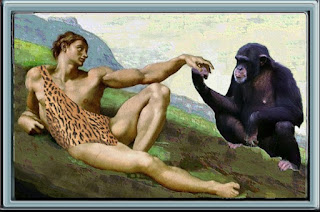
Rather than merely editorialize the fact that creationists hold unfounded opinions and make
illogical arguments, here are comments on some snippets of their views:
C1: "I would like to meet the "scientist" that can PROVE that evolution is true and not a theory."
Of course this writer would not really like to meet any such scientist because creationists display absolutely no desire to understand
reality.
Symptomatic of their
black-and-white thinking, creationists love to make challenges demanding
proof.
Biological evolution is a demonstrable
fact upon which theories of evolution are based. The evidence for biological evolution has been pronounced as "overwhelming" by
credible experts in the field. Facts can be empirically demonstrated, but no scientific
theory, or any other inference based on
induction can be
proven, though hypotheses and theories and claimed-to-be-facts can be disproven. The writer goes on:
C1: "That of course is impossible since no one was living millions and billions of years ago, and I mean NO ONE and NOTHING."
This is patently untrue! There is abundant evidence that life existed on this planet several billion years ago.
C1: "There are plenty of Creation Scientists that can show proof as to why the earth can only be 6000 years old(give or take a couple of hundred years)."
There are NO creation scientists because creationisms is religion and
not science, so "creation scientist" is an oxymoron. The statement is completely untrue. Falsifying details and
publishing unfounded attacks on scientific facts does
not constitute science. No matter what an individual's educational background,
fallacious argumentum ad verecundiam pronouncements that run counter to the facts and to the knowledge of
credible experts in a field are
without any value as science.
The mythical YEC figure of 6,000 years is based on Bishop Usher's Bible-based estimate. Science has categorically demonstrated that the Bible is incorrect in its depiction of dates–in effect, disproven.
C1: "Carbon dating and other dating methods that the scientific community has relied on for so long now are proving to be very inacurate and more and more evidence keeps popping up to prove thousands of years instead of millions or even billions of years."
No scientist claims that carbon dating can be applied to dates earlier than 70,000 years ago. Other radioactive isotopes with longer half-lives are employed in obtaining the older estimates, which are always reported with the range of error indicated. Creationists are typically woefully ignorant of actual science, preferring as they do to parrot the pseudoscientific falsifications on
junk tanks such as
AiG. The planet is approximately 4.7 billion years old, no matter how many times ill-informed and biased YECs claim that Usher's date is accurate.
C1: "When is the "scientific" community going to take its head out of their "evolutionary ooz" and realize that CREATION IS SCIENCE!"
Shouting does not help this writer's ridiculous argument.
Science is based on application of empirical scientific methodology, creationism is
religion based on an ill-founded assumption of Biblical literacy. Creationists have attempted to hijack science in order to strengthen their received, preconceived notions of Biblical inerrancy. They will never succeed in convincing any but the already-deluded because scientific methods have
disproven the Biblical statements that relate to scientific areas. The Bible is an allegorical creation myth followed by pseudohistorical moral fable.
C1: "God was the originator of science and created everything we see, and plenty of things that we don't even know exist yet."
Creationists seem to believe that whatever nonsense they make up about their supposed God will hold true simply because they say so. Such thinking is totally in keeping with the emotionality, obstinate ignorance, and illogic of their arguments. If God originated science, then the Bible is the received Misleading Pseudoscience for Dummies text, and God scores a Z- in science.
C1: "I can't imagine holding onto the idea that we evolved from some "ooz" of some of some sort and that's all we are, an accident, and there is no purpose to our lives. I think that's very sad."
That says it all. The writer, for highly emotional reasons of his or her own cannot imagine how life could have arisen from chemicals and then evolved. This is a failure of comprehension, a failure of logic, and deliberate ignorance of established facts. A sense of purpose is a psychological phenomenon. If the writer cannot sense some purpose to his or her life without being the product of Special Creation, then that, in addition to manifest and obstinate ignorance about reality, is very sad indeed.
Here's another creationist stating YEC beliefs:
C2: "YEC does not say that God created all animal life, for example, in the state it is in today. YEC does not deny that some biological evolution occurs. YEC believes that change does occur (what they believe actually requires it) but YEC believes that change can only happen within a created kind."
Because there is so much evidence for continuing biological evolution (covered by the creationist buzzword microevolution) creationists see nothing to be gained in denying that, for example, bacteria can acquire antibiotic resistance. Creationists do not perceive currently occurring genetic change as a threat because they are obsessed with denying the distant past (biopoiesis and macroevolution) in order create that gap into which they insert the man-invented notion of Special Creation.
The reference to design pays homage to
intelligent [sick] design theory, which is merely creationism in disguise.
C2: "Naturalistic secular science begins and ends with the unfounded assumption that the material is all that exists, that God does not exist, etc., etc."
Of course science studies the natural world – scientific method can only be applied to the physical, observable, tangible, and measurable. However, that is the only thing in which C2 is correct. It is not necessarily an unfounded assumption to believe that the material is all that exists, even though scientists concede the physical may not inhere all of existence. Only the material is accessible to the scientific method. The question of existence beyond the physical belongs to speculative philosophy and theology. Science is religion-neutral and does
not assume that God does not exist. Scientists may privately believe that there is no deity, particularly in view of the fact that science provides far better explanations than "God brought it about by a miracle." However, scientific method can only be religion neutral. C2 is merely using the creationist buzzword "secular" to attempt to place all scientists in the infidel camp in an
association fallacy.
C2: "(Creationism) is not about religion; it is about the Truth."
This is an utter falsehood. Of course creationism is about religion. Creationists and others of religious persuasion make a claim of "Truth" for their beliefs, but they have no good evidential, logical foundation for doing so. This is the reason that the terms "faith" and "belief" are more accurately applied to religious beliefs.
C2: ". . . God, who Jesus is, life after death, but those are all tied to this issue."
If creationism is about God and Jesus, then C2 has just revealed him or herself to have lied when saying that creationism is not religion.
C2: "True, one can be a Christian and not believe in a six day creation, but such a person is not really being consistent in their beliefs. If Genesis is open to such liberal interpretation as some give it, then why not do the same to the resurrection account of Jesus? If there was no literal Adam and Eve that literally disobeyed God (sinned), then there is no need for a Savior."
Yup. This is the underlying reason for dogmatic insistence on Biblical literalism, these black-and-white thinkers are aware that their rigid beliefs will not allow for any latitude. It's no accident that
Genesis depicts knowledge as the enemy. Knowledge does not make us sinners, but religious beliefs cannot survive full critical scrutiny.
"Genesis is foundational to the Christian faith, and it is true."
Genesis is an allegorical creation myth that is clung to by particularly reality-ignorant Christians.
Genesis is disproven.
"The Bible says that those that do not want to see the Truth will be blinded to it."
Since the Bible was written by men this statement remains accurate concerning the human foible of
denial. The fact is that the actual truth is not what creationists credulously take to be "the Truth".
C2: "Those that want to cling to the religion of evolution will always find a way to make it seem right in their eyes."
Poor, fuddled C2 is totally muddled as to what is science and what is religion. Biological evolution is a fact, the modern synthesis of evolution represents the best current scientific explanation of the observable facts. Evolution is not religion in C2's earlier definition, where it is labelled as secular science.
Creationists are typically so illogical that they do not even realize that they are making self-contradictory statements in an attempt to justify emotional beliefs. I suspect that because these individuals desperately want and need to believe that they are the salvation-selected products of Special Creation they become easy prey for any falsehood or illogical argument that appears to support their indoctrinated beliefs. (Let's be honest and call a stupid argument a stupid argument.) The stupid arguments work to support creationists' emotional beliefs, so creationists ignorantly fail to detect the illogic.
The sentence would have been accurate if it had been written as, "Those that want to cling to the religion of creationism will always find a way to make it seem right in their eyes."
No matter how passionately an illogical ignorant argument is made, that argument remains utterly without validity. YEC vehemence is really tantamount to bragging about exhibiting stupidity. It is not surprising that many Christians hold YECs in contempt.
I believe that YEC and ID appeal to those who have a cognitive disorder in that they have not attained an internal desire for logic. Further, most creationists of my acquaintance also appear to lack mastery of many operations of logic.
Piaget's "genetic epistemological" research into the developmental acquisition of cognitive schemas did not proceed beyond the achievement of formal operations by about age eleven. However, beyond the logical schema acquired in childhood, not all individuals attain the full repetoir of logical operations necessary for
critical thinking. The worldviews of many adults exhibit considerable philosophical tension, and many adults display internally inconsistent, illogical, emotional reasoning fraught with many of the errors found in
fallacious arguments. Religious beliefs, in general, force illogical inconsistencies into the
thinking process.
Creationists' arguments on religion are highly emotional, their arguments concerning science are falsehoods, their arguments about morality are rigid and bigoted, their views on politics are usually greed-motivated, hubris-filled, and doggedly unperceptive.
Labels: AiG, biological evolution, biopoiesis, Creation Museum, creationism, creationists, intelligent design, scientific method, YEC
 Life is full of interesting discoveries, so this blog will be a repository for sundry tidbits.
Life is full of interesting discoveries, so this blog will be a repository for sundry tidbits. It is with great irritation that we bring to you . . .
It is with great irritation that we bring to you . . .
























![Man [sic] created God in man's image, and plays with the shape and age of the Earth.](https://blogger.googleusercontent.com/img/b/R29vZ2xl/AVvXsEge648cl8FlkDTumcnHwi_SUyyndUsahHkHL4Dzflr_0uVKU0Nbi6Jf47Y4CXLu6vgZKIZCtBZTSVRiRZB6LNXJ2sPNsG_dCQ_-AARnMn2I4AW1pBia_T6wMeNyA06fUBB9RXvO/s320/And.Man.Created-bg.jpg)
